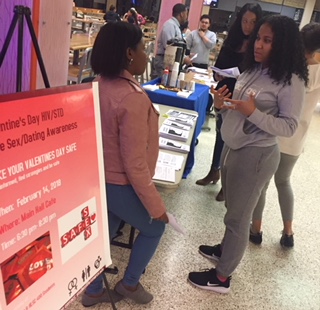Get Tested, Protect Yourself, Be Aware
Mercy’s Health Science students participated in a safe sex awareness event as part of their capstone project.

No matter how much you love your partner, or how much you trust them, it is always important to protect yourself when involved in a sexual relationship.
Whether it is a casual fling, or a serious relationship, your partners may not have protected themselves in the past, which leaves you susceptible to contacting sexually transmitted diseases. This is why sixteen Mercy College students, under the supervision of adjunct professor Dr. Alicia Chung, created an event for STD, safe sex, and dating awareness this past month.
Sexually transmitted diseases continue to affect millions of people around the world. One in four people in America have an STD, meaning that 110 million people in the U.S. are carriers and can further spread their disease to partners. Students at Mercy are hoping to educate their peers on these statistics.
“From the first day of class, we haven’t missed a beat,” said project manager, Alen Pepic. The students involved are enrolled in a Health Sciences Capstone course. Their assignment was to come up with a topic in health care and split into sections to conduct research, hold interviews, talk to different organizations, and to prepare for their event.
“We were put into groups, but still had to do our individual research. Some of the groups were HIV and STD’s, date rape, safe sex, and online dating safety,” said Laika Maurice, a senior Health Science major.
“There are a lot of organizations involved in an event. It’s not something that you can plan overnight. Even for a small event, you have to put a lot of effort into it to work in harmony. It took much group work by communicating through group chats, blackboard discussion and in person,” said Pepic.
Someone who currently has an STD is more at risk of contracting HIV than some who does not have HIV, their research proved. Students from the capstone provided information about avoiding contracting or spreading STD’s. They mentioned using condoms, getting properly vaccinated, and getting regularly tested for sexually transmitted diseases or infections. The Center for Disease Control also suggest methods like limiting your sexual partners, communicating with your partners about safe sex practices.
“People think that [an] STD or HIV is not a big deal, but when it happens to them, they are suddenly concerned,” said Pepic. “Something as little as this event—it makes people think about it. If it comes to their mind, that’s enough for us to say we did a good job.
It is estimated that nearly 20 million new STI’s (sexually transmitted infections) occur every year in the United States. Half of individuals will be between the ages of 15-24. Also, 1.1 million people in the United States have HIV and one in seven of them are not even aware they have it, according to the CDC.
“It was eye opening to see how high the numbers for Hispanics, blacks and whites were,” said Randy Laratte, another senior Health Science major.
“People who have had this experience with HIV, STD and dating issues might sit there for couple of minutes because it is bringing up memories of something they have been through. There are people who haven’t had these situations arise. Hopefully, we can educate people,” Pepic said.
Safe sex is very important to try to avoid getting an STD. It is recommended people use condoms and water-based lubricants to try to avoid STDs, HIV, or pregnancy. One common way an STI or STD can be transmitted is through semen, vaginal fluids, or blood during vaginal or anal sex, according to NSW Health. Condoms and lubricants are available in various places across the country such as pharmacies, convenience stores, and supermarkets. Become knowledgeable and protect yourself during sex.
“Use a condom. Just use it,” said Chris Costello, one of the 16 students.
Date rape is still an issue in this country, notably among college aged students. Rapists are not always strangers and seven out of 10 victims usually know the person who sexually assaulted them, according to the Bureau of Justice. To reduce your risk of falling victim to date-rape drugs like “roofies”, never accept drinks from strangers, watch who is pouring your drink, follow your instincts, and stay in a public place with your date, says New York State Police. Some popular date rape drugs are rohyponol and GHB. These drugs make the the victims forget what happened, according to New York State Police.
“You have to be strong, you have to have a strong mentality. If something is not right with your body, you should know better and go see a doctor or counselor. Right away you should go see a health professional,” the group warns.
Mercy College currently has resources within their health program and counseling department that are there to help students anyway that they can. Do not hesitate to contact them if you need to talk to someone.
“We overlook these situations but when it happens to you, you feel hopeless and don’t want to speak to anybody,” Pepic stressed. “You have to find strength in yourself to at least speak to a therapist or someone you trust.”

Tanisha Esprit, also known as Tan Tan or T, is majoring in journalism at Mercy College. She is from the breathtaking island of St.Thomas, USVI. She enjoys...







